“Storm Front”
Written by Manny Coto
Directed by Allan Kroeker
Season 4, Episode 1
Production episode 077
Original air date: October 8, 2004
Date: 1944
Captain’s star log. We pick up where we left off at the end of “Zero Hour”: Tucker and Mayweather in a shuttlepod being shot at by World War II-era P-51 Mustangs. They return to Enterprise, and it becomes clear that (a) they’re in the 1940s and (b) it’s an alternate past as the Nazis have made inroads into North America. Also Silik is seen covertly infiltrating the ship.
Archer, having recovered from his injuries in the field hospital, is being transported by Nazi soldiers in a truck. Said truck is ambushed by American resistance fighters, who are, in fact, Italian-American gangsters. They shoot Archer in the arm and take him prisoner.
Some aliens are working with the Nazis, and they seem to be in charge of the American occupation. Vosk, the alien leader, gets a report from his subordinate, Ghrath, about Archer’s escape. Vosk is more concerned than Ghrath is, which he explains by showing Ghrath his communicator, which is obviously from the future. Vosk fears Archer is a temporal agent.
Tucker and T’Pol have a moment where they share what they had intended to do when returning from the Delphic Expanse, and express their frustration with dealing with time-travel shenanigans instead of those things.
Phlox’s attempts to get the desultory Porthos to eat is interrupted by the sudden arrival of a badly disfigured human—who he eventually realizes is Daniels, albeit with different parts of his body at different ages. Phlox isn’t sure what’s causing it, how he’s surviving it, or how long he’ll live.
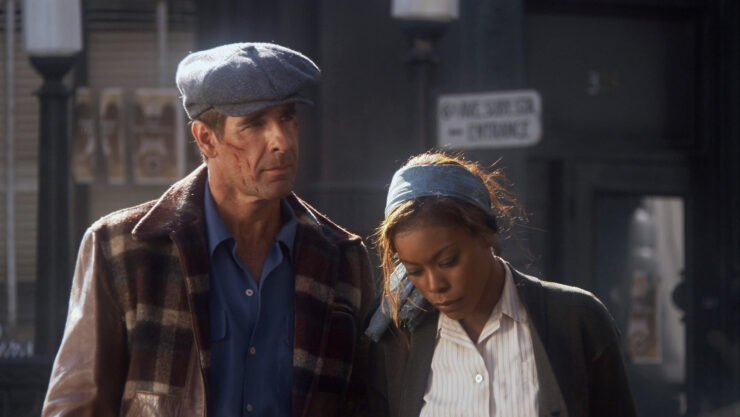
Archer is brought to an apartment in Brooklyn belonging to Alicia Travers, a member of the resistance. She confusedly answers Archer’s questions, which are obvious to her, like what year it is. Travers also assumes that Archer is in the Navy, serving on the aircraft carrier Enterprise, based on the patch on his uniform.
From the now-Nazi-occupied White House, Vosk demonstrates a plasma rifle to a German general. However, the power requirements to produce them are difficult to manage in 1944. The general is impressed, but also impatient, as Vosk’s assistance is less useful than promised, as far as Hitler is concerned.
Two members of the resistance, Sal and Carmine, enter Travers’ apartment. (They used to be loan sharks working for the Construction Workers Union before the Nazis took over.) The Gestapo are rounding up people and shooting them in their search for Archer, including interrogating one of their comrades, Vic. Archer claims his mission is classified and he can’t divulge it, playing into everyone’s assumption that he’s with the American military. Sal also has nothing good to say about the American military which, after all, failed to defend its own shores.
Daniels regains consciousness and informs T’Pol that the Temporal Cold War is now hot. Different sides are trying to alter history to their advantage. Enterprise can’t return to 2154 because it isn’t the future they know anymore. Before passing out, Daniels says they must stop “him,” but he loses consciousness before identifying who that pronoun refers to.
Travers feeds Archer a meal. The captain has changed into civilian clothes, belonging to Travers’ husband, who is fighting in the Pacific theater. Archer impresses Travers by recognizing the music she’s playing on the phonograph as Billie Holiday. It’s an underground thing, as the Nazis have banned music by “coloreds,” but some folks pass the records around to each other in secret. Travers also mentions the rumor that some of the Nazis are monsters.
Silik tries to get Tucker to fly him in a shuttle down to the surface. Tucker resists, and Silik winds up stunning him and stealing the shuttle alone.
Archer, Travers, and Carmine meet to discuss the Nazi monsters, whom Archer believes to be time-traveling aliens, thus explaining the change in history. He also witnesses Nazi prejudice and brutality first hand.
T’Pol wonders if the “him” Daniels was referring to was Silik. And yet, the Suliban removed Tucker from the launch bay before departing, when he could’ve left the engineer to die. While Silik disabled the shuttle’s transponder, Reed is able to trace the shuttle in other ways and should be able to beam down to within three kilometers of the pod.
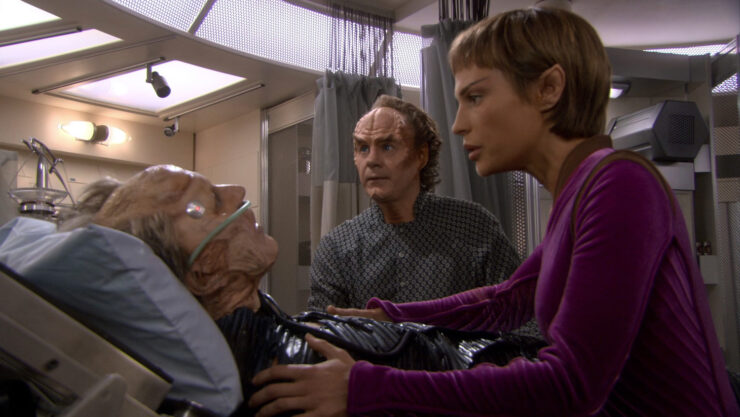
Sal and Carmine introduce Archer to an informant, a drunk named Joe, who has seen an alien working with the Nazis (he usually wears a hat, but Joe has caught glimpses).
Tucker and Mayweather beam down to the forest. They find the shuttlepod, which has crashed, but there’s no sign of Silik. They set some explosives to destroy it so the Nazis won’t get their hands on twenty-second-century tech.
Archer, Sal, Carmine, and Travers track down Joe’s hat-wearing Nazi, and they find Ghrath. Sal, Carmine, and Travers are shocked. Archer questions him, and Ghrath reveals that they know that Archer’s from the future and that Enterprise is in orbit. They’re trapped in 1944, and using the Nazis to help them get the resources to build a time conduit. When more Nazi soldiers start approaching, Sal shoots and kills Ghrath. Archer takes the alien’s communications device.
Tucker and Mayweather are ambushed and captured by Nazis.
Archer, Sal, Carmine, and Travers are also ambushed by Nazis. Sal is shot and killed. Archer keeps trying to contact Enterprise with Ghrath’s comm device, eventually getting through. T’Pol has him and Travers beamed up.
Everyone on board is thrilled to see Archer, whom they had assumed was killed on the Xindi super-weapon. Archer is brought to sickbay, where a dying Daniels explains that Vosk is the main bad guy in the Temporal War. If they stop him building his time conduit, the Temporal War will end. Daniels then dies before he can explain how that makes anything like sense.
Vosk informs his new prisoners, Tucker and Mayweather, that they haven’t found Archer yet, but they will. He then gets ready to do another test of the time conduit…
To be continued…
Can’t we just reverse the polarity? The aliens are trying to construct a time conduit with stone knives and bearskins…
The gazelle speech. Archer does a decent job of leaning into the assumption that he’s a Navy operative on a classified mission. He also scores points with Travers by recognizing Billie Holiday.
I’ve been trained to tolerate offensive situations. While in charge of the ship T’Pol pretty much accomplishes nothing, and kinda sits around with her thumb up her ass while Silik takes a shuttle and then the Nazis kidnap her landing party.
Florida Man. Florida Man Taken Prisoner By Space Nazis!
Optimism, Captain! Phlox doesn’t accomplish much more than T’Pol, as he can’t get Porthos to eat and can’t really tell what’s happening to Daniels.
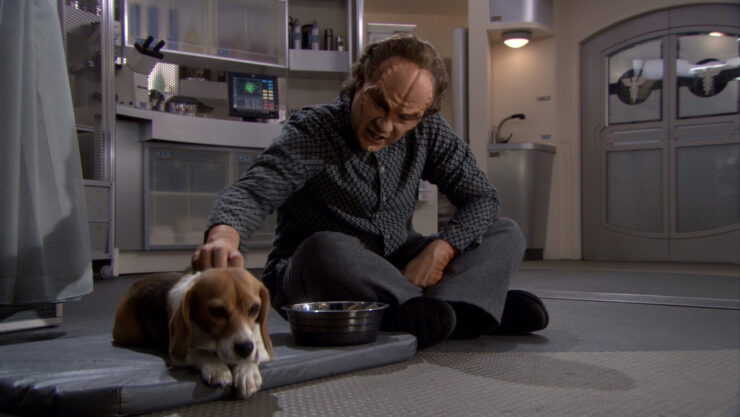
Good boy, Porthos! Porthos is despondent over the apparent death of his human, but he’s very happy to see Archer when he’s beamed up to Enterprise.
I’ve got faith…
“What was that back there?”
“That was an extraterrestrial.”
“A Martian?”
“I don’t know what planet he was from.”
“Where are you from?”
“Upstate New York.”
–Sal having his first contact with alien life, and Archer helping him through it.
Welcome aboard. We’ve got three guest stars who were better known for their roles on other contemporary shows: Golden Brooks, who played Maya Wilkes in the UPN show Girlfriends, plays Travers, while Steven R. Schirripa and Joe Maruzzo, who played, respectively, Bobby Bacala and Joe Peeps on HBO’s The Sopranos, play, respectively, Carmine and Sal.
Jack Gwaltney plays Vosk, while Tom Wright (last seen as the title character in Voyager’s “Tuvix”) plays Ghrath. The human Nazis are played by Christopher Neame (last seen as Unferth in Voyager’s “Heroes and Demons”) and J. Paul Boehmer (who was also in the final scene in “Zero Hour,” and previously played a holographic Nazi in Voyager’s “The Killing Game” two-parter, as well as One in Voyager’s “Drone,” Vornar in DS9’s “Tacking Into the Wind,” and Mestral in “Carbon Creek”).
Plus we have recurring regulars Matt Winston as Daniels (last seen in “Zero Hour”) and John Fleck as Silik (last seen in “The Expanse”).
Brooks, Schirripa, Gwaltney, Neame, Winston, and Fleck will all return for Part 2.
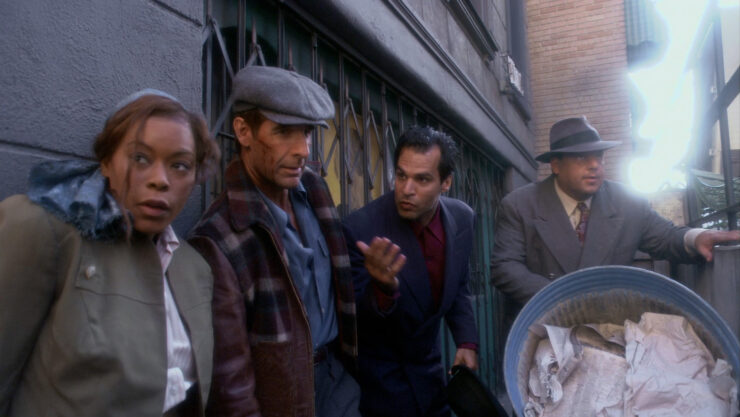
Trivial matters: This episode takes place entirely in an alternate 1944, with no scenes in the show’s “present” of the twenty-second century. It’s only the second time Trek has had an episode take place entirely in the twentieth century, the other being the original series’ “Assignment: Earth.”
The aliens are called the Na’kuhl in the script. Ghrath’s name also is only seen in the script.
The Billie Holiday song playing over dinner for Archer and Travers is “My Old Flame.”
It’s been a long road… “How do we return to our century?” This episode starts out promising, with Tucker throwing a nutty on the bridge after he and Mayweather were shot at by .50-calibre bullets, Archer being taunted about American movie stars of the 1940s by a Nazi, and the American resistance apparently being made up of Italian-American gangsters.
But it goes absolutely nowhere interesting. The human Nazis are inexplicably blasé about taking orders from an alien that looks like the lead in Nosferatu. At no point in this episode filled with Italian-Americans (most of whom are likely first- or second-generation) does the fact that Italy is allied with Germany come up. T’Pol is utterly ineffectual in command, and while one can come up with reasons for this—not the least being total exhaustion after the events of the end of season three—the episode itself does not provide that reason, or examine it in any way.
The Temporal Not-So-Cold-Anymore War continues to make nothing like sense. The aliens are so incredibly critical to the whole thing, yet we’ve never seen them before (or since). No explanation for what they’re doing, exactly, beyond changing history, is made.
Then it all ends on more of a curb-hanger than a cliffhanger, as Vosk watching a machine being tested isn’t exactly seat-of-your-pants stuff.
It’s disappointing, but perhaps not surprising, that rather than deal with the aftermath and fallout of last season (which will finally happen in the season’s third episode), they instead open with SPACE NAZIS! It’s a lot more disappointing, however, that the space Nazis are spectacularly uninteresting.
About the only scenes that work are the banter among Steve Schirripa, Golden Brooks, Joe Maruzzo, and Scott Bakula. The former three do an excellent job of creating their characters, an interesting transposition of French resistance fighters to 1940s America. And nobody ever went wrong using Billie Holiday as part of the soundtrack. But it’s all in service of a nothing story.
Warp factor rating: 5
Keith R.A. DeCandido will be in the exhibit hall at GalaxyCon Raleigh this coming weekend in North Carolina, where he’ll be selling and signing his books and comics, as well as some hand-made stuffies created by his wife Wrenn Simms. Come by and say hi!










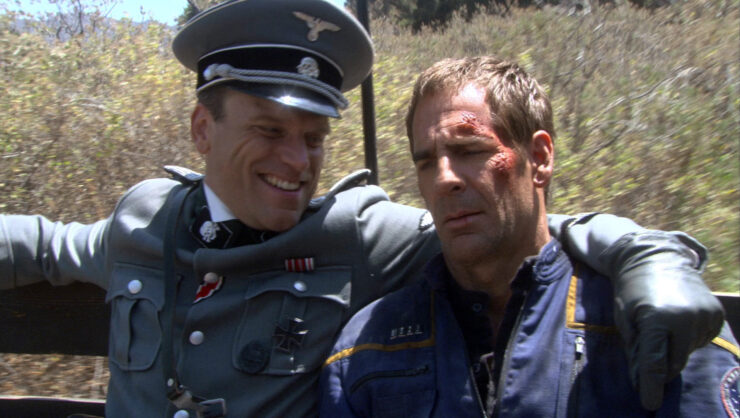
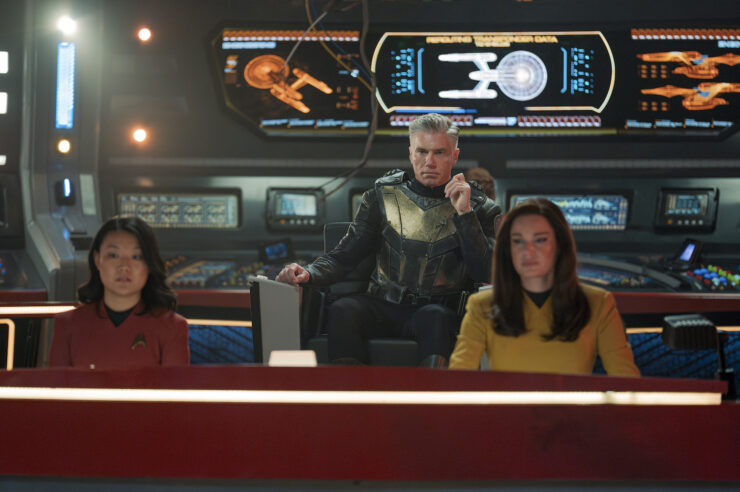
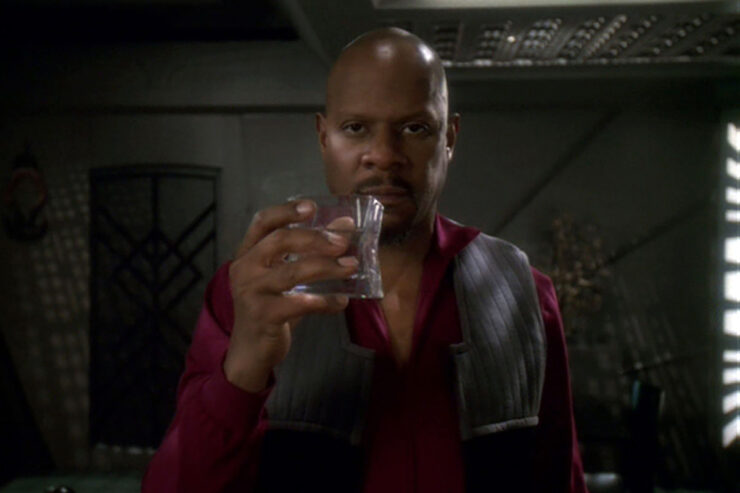
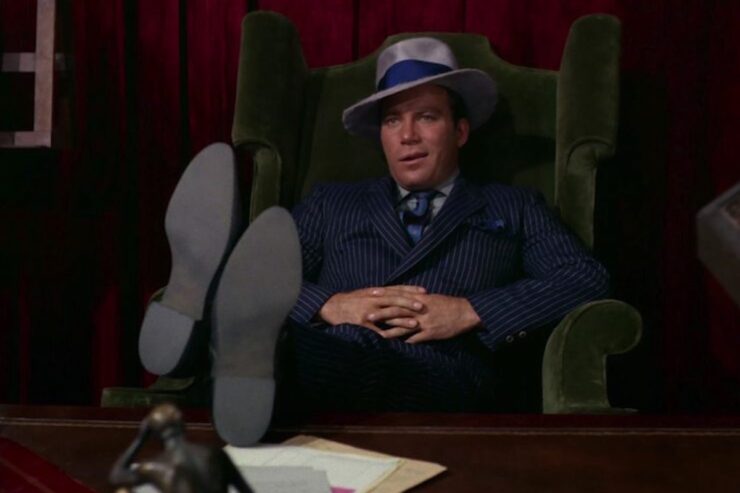
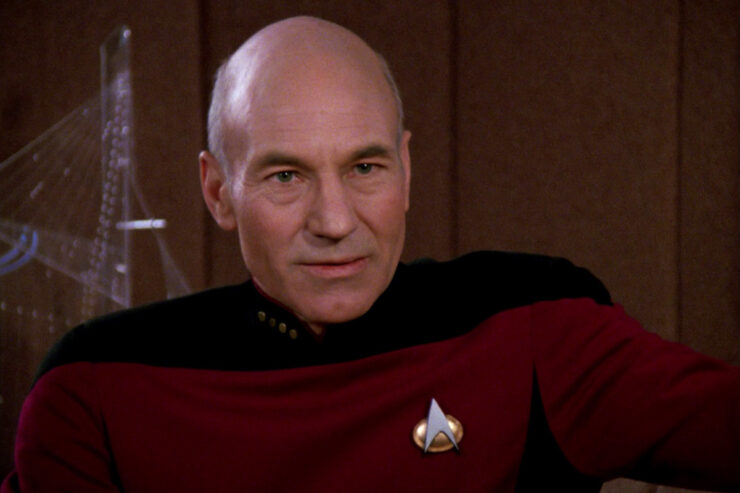
@krad, your NYC is showing – Upstate New Yorkers aren’t aliens, they’re just foreign nationals. (-;
I’d like to pretend that, having felt a fondness for this episode prior to the Rewatch in much the way I felt a fondness for the show as a whole (“It wasn’t very good, but I may well love it anyway”), I have been able to rewatch ‘Storm Front’ and come to a more clearheaded assessment of it’s quality.
But I’m a simple man and seeing Steve Rogers promise that the Nazis would have no easy time occupying Brooklyn brought to life long before THE FIRST AVENGER was in draft stage* pleases me (One must also admit to having watched the second half of this double feature right after the first, breaking my usual rule in the process).
I am also delighted to see the running joke that T’Pol ‘just can’t with’ time travel alive and well (Not to mention delighted by seeing Doc Phlox be Porthos’ dog sitter yet again: I really, really want to know if he ever introduced Earth Dog to his own extensive family at some point).
Oh, and bonus points for Captain Archer exercising some fairly sound tradecraft: as ever he’s surprisingly good at being a secret agent, when he must put his mind to it.
*Pun intended.
This was conceptually ridiculous and a bizarre swerve. They already did space Nazis in “The Killing Game” on Voyager; why repeat themselves here? Even the Na’kuhl’s design was repetitive. During the months between the season-3 cliffhanger and this premiere, a lot of viewers were convinced the Nazi aliens were Remans, because they’re both batlike designs, albeit clearly different in the details.
I did like Alicia Travers a lot, and I liked Archer’s interactions with her. She was the highlight of the episode.
It shows how little the producers ever cared about the Temporal Cold War element, which the network pressured them to include over their resistance, that when they do a 2-parter finally bringing an end to the whole thing, they don’t even bother to tie it all together but just bring in a new threat out of the blue. But I guess their thinking was that in order to bring the Cold War to an abrupt end, it made sense for a new player to come in and make it a hot war, escalating things to the point that the combatants decided they had to end it for good.
My problem with this is that a war between time travelers in different centuries shouldn’t really have a definable ending, or even a definable beginning. Indeed, in DTI: Watching the Clock, I portrayed the TCW as multiple temporal conflicts that overlapped in time by their very nature, so that different factions got entangled in each other’s battles across centuries.
I wonder if portraying Italian gangsters as an anti-Nazi resistance was a nod to Paul Sorvino in The Rocketeer. “I may not make an honest buck, but I’m a hundred percent American!”
I’m glad the script had Archer call the Na’kuhl an extraterrestrial rather than an alien. It’s often forgotten today, but the usage of “alien” to mean “being from another planet” didn’t really catch on outside of prose science fiction until the 1960s. So if Archer had said “alien,” a 1940s listener would’ve assumed he meant a foreigner.
Oh, I almost forgot: you are exactly right about this episode having more than a few delightful guest performances – that despicably chummy Nazi is proof that even an old saw (Our Hero is in the hands of NAZIS!) can still get a new twist now and again.
I’m philosophical about this two-parter. It’s nothing to write home about, but it at least does a decent job of wrapping up Season 3’s WTF cliffhanger. The fact that it also ends the Temporal Cold War doesn’t really make sense, but nothing else about that arc really did anyways, so it’s okay by me.
I do wish that the writers had done more research into what every other country was up to during the Second World War, though. Not only is there the status of the Italian-American gangsters, we also hear a speech from Winston Churchill. This would seem to imply that the British Empire is still in the fight; but the Nazis’ war map of their occupation of North America just stops right at the Canadian border, indicating that Canada has made a separate peace; but then, in the propaganda reel at the start of part two, they explicitly show the Canadian PM Mackenzie King as an enemy of the Reich. And that’s without even getting into the question of whether the Nazis would have even come to power in Germany in the first place if the Bolsheviks hadn’t formed the Soviet Union.
@2
Thank you, I always loved that Paul Sorvino quote.
I remember once seeing someone take issue with that bit in The Rocketeer. Why would an Italian-American gangster be so fervently anti-Nazi? Why would he care? Well, as I understand it, Mussolini tried hard to wipe out the Mafia in Italy. So, with him being allied with Hitler, it wasn’t much of a stretch to bring up those feelings. This was later sort of flipped in the movie Bugsy, where the Jewish-American gangster Bugsy Siegel badly wanted to kill Mussolini. Hey ho, a fascist is a fascist.
As for the episode, I thought it was… fine. Nothing to write home about, though.
2@@@@@
Why Nazis? Well, it’s conceptually easy to justify. We need to make a big impression on why our villains are villains and saying, “They’re allied with the Nazis” will certainly do it. Fine, the Nak’hul are irredeemable scum in one scene. ST also has a long history with National Socialists like Doctor Who and that makes sense since they’re the opposite of ST’s values. “Patterns of Force”, the Hirogen, and so on.
6@@@@@
Actually, they could have made the movie Rocketeer go the extra mile because Los Angeles was, in fact, controlled by the JEWISH mafia as opposed to the Italian mafia so Neville Sinclair being the absolute dumbest man alive by allying with the local criminals wouldn’t have been out of place.
But yes, the wrap up to the Temporal Cold War was part of Season 4’s essential Retool of the show where I feel ENT finally found its footing. The Nak’hul don’t really make an impression beyond being “bad guys” and I kind of wonder if they shouldn’t have used Future Guy and the Suliban more extensively. Maybe have the Romulans vs. the ENT crew and then it all gets written out of the past in the end (even if that’s a rip off of “Year of Hell”).
But I’m glad they made the effort. Because while the Execs may have forced the TCW on the writers, the FANS didn’t know this and the fans (like me) were waiting for a resolution. It would be essentially like dropping all the hints about the Dominion and never doing any sort of payoff.
Watching this, I’m a bit miffed about how they did time-traveling Nazis in space. Both not brutal enough (but then they didn’t want an R rating) and with too many flags in the wrong places. But, well, it isn’t a historical series.
Italian mobsters with the underground actually had a historical parallel. They knew whom not to trust, in Sicily. And also on the NY docks. By the way, mobsters getting themselves union cards so they could move on construction sites, not loan sharks for the union …
I liked how the Na’kuhl had trouble powering all their fancy hardware with 20th century batteries. That’s overlooked way too often in time travel stories.
o.m.: My point was that the fact that Italy was allied with Germany should’ve come up at some point.
—Keith R.A. DeCandido
I remember trying to watch a “little-known” alternate history sci-fi show called Man in the High Castle a few years back, and giving up at the end of its pilot episode, because of how dull it was. You’d think a what-if show about the US being overrun by Nazis would make for a compelling story. And yet, somehow, that pilot episode failed to spark or hold my attention in any meaningful way.
I’ll give the “Storm Front” two parter this much. It holds my attention more than High Castle ever did. I guess we have Kroeker to thank for that. Because that’s about all the episode has going for. That and Archer’s scenes with Travers (you could argue that for once Archer comes out better than everyone else in the cast). Everything else is a mess. As pointed out, it’s insane just how linear the Temporal Cold War plot plays out, and makes little to no sense.
But that’s the mess Manny Coto was left with when last season ended. Might as well play the whole thing out as a hot conflict coming to its head so we can be done with it and move on (which stays in line with the way the cliffhanger season enders have been dealt with on Trek throughout the Berman era. The writers never plan the ending of those stories in advance – they always resolve it after they come back for the new season, just ike Piller did with BOBW).
Um, Man in the High Castle isn’t “little-known” by any stretch. Indeed, it was pretty much the only Philip K. Dick novel that hadn’t been adapted up to that point….
—Keith R.A. DeCandido
@10/krad: I meant to put “little-known” with quotation marks. I’m well aware of the show’s (and novel’s) reputation.
1) By 1944, Italy was effectively out of the war (at least on the Nazi side). Yes, there was a rump, “Salo Republic” under Mussolini, but for all practical purposes the Italian Government had surrendered to the Allies.
2) While there certainly were other mobs in New York, choosing the Italians may have been to make the story a bit less inflammatory (Jewish mobsters vs Nazis may have been seen a potentially inciting RW violence)
3) For similar reasons, choosing Nazi Germany as the enemy lessens the possibility of some saying the story showed Racial bias. Imagine instead of NYC, the episode had been set on the West Coast with San Francisco occupied by Imperial Japan and Mexican farmhands as the resistance. On one level it might work, given the connection San Francisco has to Star Trek, but there would be outrage at racial stereotyping.
4) I don’t think of Storm Front as being the end of the Temporal Cold War. All it did was for the moment end the factions meddling in mid 22nd century Earth History. Also, I look at it less a fixing the timeline itself and more putting individuals back into their quantum reality. Essentially the quantum Realities make up a tapestry. Pull on a fraying thread and it might fall apart. Keep all of the threads (characters/events etc) where they belong and you see the intricately woven pattern. Of course that works from the viewpoint of an individual faction. Other factions are simply trying to unravel and reweave the threads to get the pattern they desire
@12/Charles Rosenberg: “I don’t think of Storm Front as being the end of the Temporal Cold War. All it did was for the moment end the factions meddling in mid 22nd century Earth History.”
That’s not how Daniels explains it at the end of Part 2 — he talks about it like it’s over for good. And Discovery reinforces that later on. It doesn’t make much sense, but it’s a quick-and-dirty way for the producers to finally wash their hands of the damn thing.
I was under the impression that Berman and Braga wrote the season 3 cliffhanger as an FU when they realized they were being ousted as showrunners, and Manny Coto was stuck with having to resolve it.
@14/Sean: Even if it’s true that Berman & Braga were pushed out by the studio as Memory Alpha claims, they were reportedly quite happy with Coto’s work. I don’t think they would’ve tried to punish him for a decision that wasn’t his responsibility.
And really, among writers, creating an impossible cliffhanger that another writer has to figure a way out of isn’t an attack or a punishment — it’s a friendly challenge.
I wasn’t blown away by this episode, but I can’t really hate it, partly because something had to be done with the weird cliffhanger from the previous season, and partly because it helps to wrap up the TCW. As KRAD says, it doesn’t make sense that it does, but I remember just being happy that it was over.
I do remember liking the Travers character, so there’s that.
@2. ChristopherLBennett & @6C.T. Phipps: I imagine that half the reason ENTERPRISE went with Maxine’s was because Westwood might well have sued them for depicting Soviet gonzo/time travel shenanigans (COMMAND AND CONQUER: RED ALERT actually did something with time travelling Red supervillains at about this time, I think).
The other half is, I suspect, was the writing team asking “How do we end this d—- Cold War as economically as and as entertainingly as possible?” (To which somebody presumably cried “NEW YORK VS THE NAZIS!” – which is, I hope you’ll agree, a high concept not to be sniffed at).
@8. krad: I assume the subject never came up because explaining why Italian-Americans were shooting at Nazies when Fascist Italy was being treated as the Third Reich’s insufferable ethnic sidekick would have demanded explanation of the sort that the writing staff didn’t want to spend time on (On an in-universe level, it’s quite possible that in this alternate history Italy picked a fight with Hitler* and lost badly: heck, even in history as we know it, quite a few zoos World Italians picked a fight with Mr Hitler even before the Italian Co-Belligerent Forces were formed).
*I understand that Mussolini actually opposed Hitler over the Anschluss at one point: it’s not impossible that the Alternate History of the STORM FRONT timeline took this opposition further than it ever went in our own history).
And it’s not as if Berman and Braga left Enterprise completely. They were still there supervising from a distance. Just not running it on daily basis. Coto has repeteadly said he “moved in with them”.
I was listening to a recent Inglourious Treksperts podcast that invited both Braga and writer/producer Mike Sussman to discuss Manny Coto’s passing and went into detail on the differences between the writing process and how season 4 differed from previous seasons. Worth a listen. It also had a never-before heard Coto interview, made not long before his passing. According to that podcast, Brannon Braga was all but ready to throw in the towel and move on from Trek. It also details how Braga tended to rewrite everything himself, burning himself out in the process, while Coto was more willing to share the responsibility with the other writers.
“The Temporal Cold War has become an all-out conflict.”
Whilst there is a slight changing of gears with a change of control behind the scenes, I actually rather enjoyed this. The cliffhanger of Tucker and Mayweather getting shot at gets dispensed with fairly quickly, and Archer is suddenly a lot less badly injured than he was at the end of the previous season, but Archer’s plotline works quite well. He gets to do the traditional thing of falling in with a plucky young woman among the locals, but this doesn’t get dragged out too long and the episode is sensible enough to have him back on Enterprise and driving the plot by the end of the first episode. The crew thinking he’s dead lasts just lost enough for his triumphant return to work. T’Pol looks as though she’s trying really hard to resist the urge to hug him. Even Porthos gets a nice reunion, after a sweet little scene with Phlox, and it means Archer gets a moment with Daniels, which is appropriate given that he’s the one Archer has the biggest connection with.
Unfortunately, this two-parter’s biggest weakness is that the alternate Second World War doesn’t make a lot of sense. (And this seems to be down to the new regime, since Berman and Braga apparently intended Archer to be in Germany, or at least Europe, at the end of the previous season, rather than there being Germans in New York.) The obvious explanation is that Vosk has helped the Germans be more successful, but instead of the show going with that, it seems that Vosk and his people got stranded there by accident, found the Germans already in control and are just using them to get home. As amusing as the image of the White House swathed in swaztikas is, it’s hard to work out how things could have changed and led to the Germans invading the East Coast of the United States: The next episode has a go but it doesn’t really work. Even worse, we’re told they’re simultaneously fighting the Russians: Fighting a war on two fronts was a disaster for Hitler in our history, how much worse would it be when those two fronts are 5,000 miles apart? Incidentally, according to an online search, the speech Churchill makes at the start is one he made to a group of young Americans at Harvard in 1943 (which doesn’t quite fit the timescale of this episode, but hey, it’s an alternate timeline), something to bear in mind next episode. I know she says it used to be a good neighbourhood “even for coloureds”, but is it really likely Alicia didn’t get racist remarks like that before the Nazis turned up?
Tucker’s annoying when he blows up at T’Pol during the initial briefing, but at least he goes to see her afterwards and admits he was out of line: Maybe he’s growing as a person. He doesn’t seem to react when Vosk mentions “your colleague”, something else to bear in mind next episode.
And yes, the first time we’ve seen Silik since the Season 2 finale: He doesn’t get much to do here, but given how central he was in the show’s early days, it’s right that we see him again as that storyline draws to a close.
Christopher Neame as the German General, last seen almost unrecognisable under a big beard and wig as a holographic Viking. I believe he is the only actor to have done Doctor Who, Star Trek, Babylon 5 and Blake’s 7.
Channel 4 cut Sal killing Vosk’s deputy (AKA Grath), who just disappears from the storyline. They may have cut Sal’s death too, although the scene’s a bit confused so I may just have missed it: At least that does get referenced in Part II. Unfortunately, the episode doesn’t so much build to a cliffhanger as just kind of stop after 40 minutes: Are we meant to be impressed by the machinery or something?
@19/cap-mjb: “Unfortunately, this two-parter’s biggest weakness is that the alternate Second World War doesn’t make a lot of sense… The obvious explanation is that Vosk has helped the Germans be more successful, but instead of the show going with that, it seems that Vosk and his people got stranded there by accident, found the Germans already in control and are just using them to get home.”
It’s very wibbly-wobbly timey-wimey — the idea, explained in part 2, is that some faction from Vosk’s future, after he starts the hot war, goes back to an earlier time and assassinates Lenin, so Vosk arrives in a past already altered by the war he hasn’t started yet. Which isn’t how Trek time travel logic usually works, but Daniels does say the war is destroying time, so the usual rules of causality are collapsing.
@20/CLB: “Which isn’t how Trek time travel logic usually works”
I don’t know, it’s in line with something like “Future’s End”, where Voyager and Starling are having to deal with the consequences of things they haven’t done yet and ultimately never do.
I know what’s said in Part II but it’s still odd that the show ignores the obvious “advanced aliens are helping them” explanation in favour of saying it’s an alternate history where the Russian Revolution never happened and pretending that somehow explains it. (But more on that in Part II.)
This alternate Second World War is reasonably enough a crude copy of historic events; it’s only sci-fi even if it is a two-parter. I suppose instead of making these events to be erased, they could have made this the history of the Mirror Universe, and for instance the U.S. not fighting Germany at all but freely joining the Axis. But then the difficulty would be finding anybody nice in that universe.
Skimming Wikipedia indicates that almost exclusively actual citizens of Italy were interned in the real U.S. during the Second World War, whereas we know what happened to George Takei’s family, he has made such a fuss. I don’t suppose he is much better off in the “Storm Front” world.
My read on the “Temporal Cold War” is that it is indeed a complex game of many players intervening in the past, and that “Storm Front” is the incident, or a version of the incident, that the other TCW portrayals are a response to – and is the opportunity to stop it all as it starts.
In “Doctor Who”, it seems that “The Last Great Time War” – but not the series – effectively started, or broadened, when the “Time Lords” sent an agent known as “The Doctor” to prevent the artificial origin of, and ultimate universal conquest by, a mean, mechanically assisted species in “Genesis of the Daleks”. The Doctor decided that exploding the laboratory full of prototype Daleks was genocide that he was not willing to carry out, but Daleks then proceeded to make war on the Time Lords by time travel of their own. So that need not have happened. A difficulty with this explanation is that the Doctor had often fought the Daleks before (from his/her point of view) or after (from theirs), and they’d already used time travel to come after him/her, so does that not count as the Time War? Well, as I said, it’s only sci fi. ;-)
@19. cap-mjb: I wonder if the young lady’s kind remarks about her neighbourhood pre-war might be grounded in simple nostalgia – since NYC isn’t Dixie, there’s ample reason to believe locals would regard the pre war situation as immensely preferable to being occupied by the Nazis.
@23/ED: Entirely possibly, yes. I doubt the Nazis are the first people Alicia’s met who thought she should “go back to Africa”, but they’re probably the first who could actually make her do it.
@21/cap-mjb: “I know what’s said in Part II but it’s still odd that the show ignores the obvious “advanced aliens are helping them” explanation in favour of saying it’s an alternate history where the Russian Revolution never happened and pretending that somehow explains it.”
I can kind of see the logic of it, though. They wanted to a) show an altered WWII and b) allow Archer & crew to prevent Vosk from causing the alteration in the first place. In a Trek series set in a later era, they could’ve allowed the crew to see the altered history in the ’40s and then travel further back to the instigating incident, but this is a crew that has no ability to time travel under their own power; also, the show’s budget was cut, so they probably couldn’t afford to depict two different historical periods. So the situation had to be causally convoluted enough to put the effect before the cause, so that the crew’s actions in the 1940s would undo the changes that happened in 1917 and after.
Which also serves the idea that that TCW has gone completely out of control and is wreaking chaos on the timeline, so that nothing makes sense anymore. It helps underline how bad things have gotten and why the temporal factions agree to end the fighting once and for all.
I really dislike this episode for many reasons, all ably outlined by Krad and others. The only thing going for it in my mind is that there isn’t a decontamination soft porn scene tacked on.
Regarding the Mafia as an element of the resistance, the mafia worked closely with the US intelligence and military for the duration of ww2. “Lucky” Luciano bargained an early release with the promise of cooperation on intelligence together with a guarantee of no labour issues in the New York docklands.
There was also collaboration between the wider Mafia in Sicily with the US in preparation for Operation Torch. It doesn’t seem a massive stretch for Italian Americans to be in an American resistance movement by 1944, after the German occupation of Italy.
daniel: I don’t think it’s a stretch at all, but the episode feels like it’s unaware that Italy was allied with Germany and Japan…..
—Keith R.A. DeCandido
@27/krad: It’s an alternate timeline. Who knows if they were allied or not? And since Italy is never mentioned one way or the other in the 2-parter, I don’t think you can jump to any conclusions about what the writers were aware of. It just didn’t come up.
The Mafia aiding the Americans against Mussolini in revenge for the latter’s crackdowns is something that is historically right. As is the large number of Italian Americans who fought against Mussolini. This is so famous that it was the opening of the Mafia 2 video game where the protagonist sees the local Dons serving as interpreters and negotiators, using a historical one.
Really, Italian Americans had NO support for Mussolini and the suspicion of them being disloyal was just racism.
Heck, there’s an italian american character in The Big Red One (which has Mark Hamill in a somewhat grittier role than Luke Skywalker)who regards Mussolini and the Germans as the enemy, but not Italians in general.
I usually skip this 2-parter when it comes to an Enterprise rewatch. Space Nazis is just too “been there, done that.” Not a promising start to the season but we know it all gets better.
@2 Chris Actually, if they were Remans, it would have made things a tad more interesting seeing what the rest of the fourth season tries to build up with the Romulans
While I agree that the comments made regarding this episodes’s weaknesses are valid, they did not detract from my enjoyment of it. IMO, they needed to remove the Temporal Cold War storyline from Season 4 completely to focus on Federation-building. That was off to a good start, even though show got short-shrift on storytelling with its cancellation.
As for Man In The High Castle, I was looking forward to this series, but also did not make it past episode 1. While I generally liked the book, I think Dick also got the ending chopped, as it just dropped off of an unsatisfying cliff. Maybe he hit writer’s block and just wanted to get onto something else?
@33/Arnold Gill – I seem to recall hearing somewhere that PKD intended to write a sequel, but he needed to delve too deeply into Nazi atrocities to get a more granular feel for what their reorganization of the world would have looked like, and found that he really didn’t want to spend a lot of time dwelling on it.
@34/jaimebabb: Reminds me of the time I had tentative plans to write an epic interstellar war trilogy, then realized I was more interested in the rebuilding and political realignments after the war and intended to devote the third book to that — and then it finally struck me that I had no desire to write a war story at all, because it’s just too grim for me.
@35/ChristopherLBennett – Every so often, I will get some fantastic idea for a story that I, personally, have no interest in writing.
@9 – absolutely agreed on Man in the High Castle. What a wonderful premise for a book and television series, and what a glacially slow slog It actually turned out to be. I tried, for nearly a season, to get hooked, thinking It was impossible for it not to get better. But it never did.
As for this episode, this was the point that the temporal cold war storyline stopped triggering my mild annoyance, and transitioned to outright disdain. As has been noted, some of that is due to the fact that it’s supremely boring, But I guess for me it’s more of a personal preference in that I prefer it when a series offers a transitional, thoughtful debriefing episode after a big conflict is resolved, when there is tme to exhale and relax with the characters and talk about the fallout, relationships, and the future. As good as Best of Both Worlds parts 1 and 2 were in TNG, I am partial to the following episode, “Family”, which I have long said is my favorite episode of any Trek series, because of the character study of a man coping with unimaginable trauma and guilt by reaching out to his estranged brother, who ironically is revealed to be the one person who can help.
My personal preference would have been that they take a breath amd deal with the aftermath of the Xindi arc and how it affected the characters, primarily Tucker. I mean, his sister seems entirely forgotten after this, except for the admittedly touching moment when we find out his clone baby with T’pol is named after her– But even that is T-pol’s idea.
All that said, I absolutely emphatically agree with Krad’s rating of at least 5. Any episode that might have introduced at least one Trek fan to Billie Holiday immediately raises its value by at least five points, if not more…
Golden Brooks was the highlight for me. That’s my kinda network crossover.
Star Trek Online did a fine job building out the Temporal War arc, including giving the Na’khul a pretty compelling reason to want to alter the timeline in their favor. (long story short, their star was turned off with future technology and the Temporal Integrity Commission said, “It sucks, but was supposed to happen, because of this the future will play out how it’s supposed to”)
I find it amusing that this is the first shuttle lost in over three seasons of Enterprise, and it wasn’t because it was flimsy, it was blown up on purpose. Compare it to Voyager, set two centuries later where you’d think shuttles would be more durable, and losing them became a tiresome cliche.
@39/Thierafhal: The cliche of Voyager’s shuttle losses is exaggerated. They lost none in season 1, 3-5 in seasons 2-3, at most one in season 6, and one in season 7. The only heavy shuttle losses were in seasons 4-5, where they lost between 5 and 9 shuttles. It got out of hand there, so they dialed it back in the last two seasons. https://www.ex-astris-scientia.org/inconsistencies/inconsistencies-voy.htm
(Not unlike the TOS “redshirt” cliche, where nearly half the total number of onscreen redshirt deaths were in just three episodes, “The Changeling,” “The Apple,” and “Obsession.”)
And it’s always been a Trek cliche since well before Voyager that shuttlecraft are mainly featured in episodes that require shuttle crashes — going back to the original, “The Galileo Seven.” Which is an extension of the wider TV convention that if an episode centers on a plane trip, that plane is liable to crash or to need the hero to keep it from crashing.
@40/CLB: With all that being said, I still found it to be a tiresome cliche.
@41/Thierafhal: Thinking about it, I think the reason ENT didn’t crash shuttles so much is that they depended more on shuttles as their primary means of ship-to-surface or ship-to-ship transportation, and they didn’t have as much ability to replace them as later ships did. In the later shows, transporters are the default, so shuttles usually only show up in stories that specifically need a shuttle, which are disproportionately likely to involve the shuttle crashing or getting lost somehow. In ENT, shuttlepods were used routinely and thus were more likely to play an unexceptional role in the stories.
Since shuttles have become part of this conversation, I’m wondering if the speed of Enterprise‘s pods has been established. The shuttles on later shows are warp-capable, but as precious and new as warp technology is on Enterprise, I wouldn’t think that would be a feature the shuttlepods would have.
Archer with Alicia, and beaming her up to Enterprise, reminds me of Picard and Lily in First Contact. I would guess there will be similar beats in Part II (which I haven’t yet seen).
@43/terracinque: No, shuttlepods were explicitly not warp-capable — see “Shuttlepod One.”
Even TNG shuttlepods (as distinct from the larger shuttlecraft) weren’t meant to be warp-capable, though one or two later episodes glossed over that, probably because it was easier to use the full-size shuttlepod mockup on a set than the shuttlecraft one.
Some sources over the decades have claimed TOS shuttlecraft were incapable of warp, even though they had nacelles and were repeatedly shown making interstellar journeys or pursuing ships at warp (as in “The Menagerie”).
I remember that the first two episodes of season 4 made me stop from watching the rest of the series when i first tried to watch ENT…now i’m just skipping through them, not worth the suffering. :D